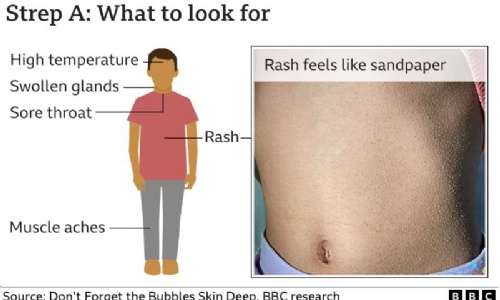
Strep A infections can include illnesses such as scarlet fever, sore throats and impetigo.
Although scarlet fever is usually a mild illness, it should be treated with antibiotics to minimise the risk of complications and reduce the spread to others.
The symptoms of scarlet fever include a sore throat, headache, fever, nausea and vomiting. This is followed by a fine red rash which typically first appears on the chest and stomach, rapidly spreading to other parts of the body. On more darkly-pigmented skin, the scarlet rash may be harder to spot, but it should feel like 'sandpaper'. The face can be flushed red but pale around the mouth.
If you think you, or your child, has a Strep A infection (which includes scarlet fever, throat infections and impetigo):
• see your GP or contact NHS 111 as soon as possible
• make sure that you/your child takes the full course of any antibiotics prescribed by the doctor
• stay at home, away from nursery, school or work for at least 24 hours after starting the antibiotic treatment, to avoid spreading the infection
• If you or your child has a high fever, severe muscle aches, pain in one area of the body and unexplained vomiting or diarrhoea seek medical help immediately
Complications
Children who have had chickenpox recently are more likely to develop more serious infection during an outbreak of scarlet fever and so parents should remain vigilant for symptoms such as a persistent high fever, cellulitis (skin infection) and arthritis (joint pain and swelling).
If you are concerned for any reason please seek medical assistance immediately. If your child has an underlying condition which affects their immune system, you should contact your GP or hospital doctor to discuss whether any additional measures are needed.
